While Alphabet is primarily known for the Google search box that allows us to find any information on the internet quickly and simply, it is the immense data generation and AI capabilities underpinning this blinking box that not only entrench Alphabet’s dominance in online advertising markets, but are forming the basis for Alphabet to develop positions in a range of adjacent industries. These adjacent industries represent some of the richest opportunities for disruption across the economy, spanning high performance computing, transport and healthcare.
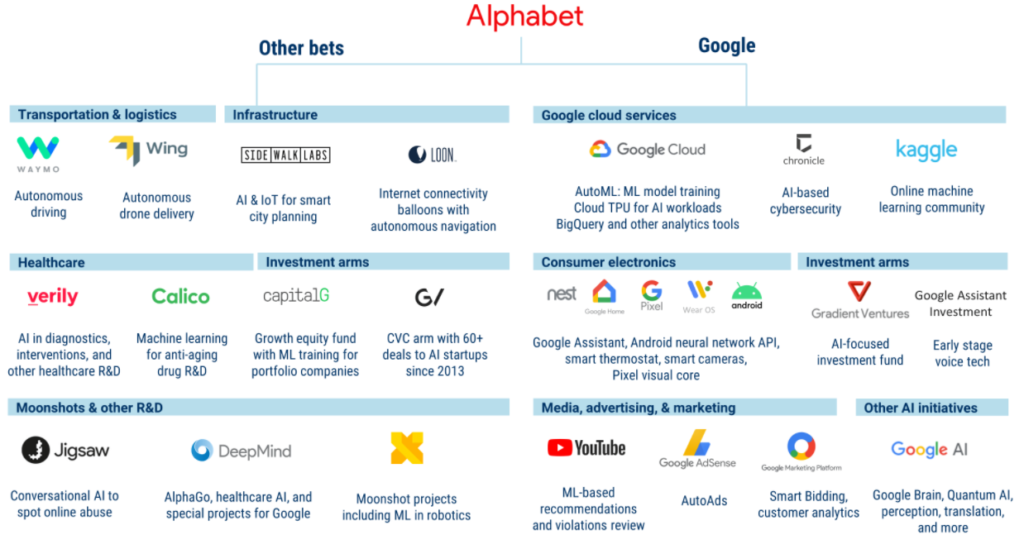
Source: CB Insights report, Alphabet in Ai
The foundations of Alphabet’s success and expansion: Data generation and AI
Data generation combined with artificial intelligence will define success in the digital age, and on this front Alphabet has established itself as the global leader. In terms of data, the breadth and purity of Alphabet’s data generation is unmatched with >5bn estimated daily Google searches providing an unrivalled insight into what customers are interested in and thinking. This primary data takes on even greater importance in a world where privacy changes are making it more difficult for companies to surreptitiously follow individuals around the internet to build a profile. In comparing primary data, while social media is focused on an airbrushed version of life and its activities, the intent of seeking answers from the Google search bar leads to materially different outcomes in terms of insights. As an example, for all the gushing Facebook posts about husbands, the Google search bar provides a very different understanding of the true mentality of many wives.

Source: A generic Google search on husbands
In terms of AI, when benchmarking across a range of real-world applications against peers, again Alphabet shows its dominance. We have seen this in maps where the initial Apple Maps application would take you on a “creative” route to your end destination, and in search where despite the resources of Microsoft, Bing searches will take you to the general vicinity of what you are looking for but will not deliver the accuracy seen with the Google search algorithm.
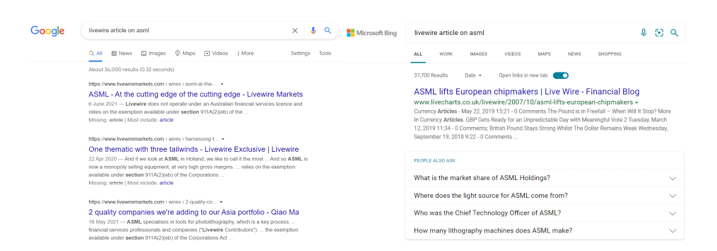
Source: A search for a Livewire article on ASML
Opportunity 1: Autonomous transport and logistics
Applying these data generation and computational abilities opens a range of new opportunities for Alphabet. The ultimate AI challenge of recent times is autonomous driving given the sheer complexity in data gathering and decision making that it represents. Given the challenges, while many companies have made bold statements around aspirations, few have made as much progress as Alphabet who are leading the way in terms of miles driven (20m road miles and 15bn simulated miles as at Jan 2020) and autonomous performance (industry leading disengagement rate) culminating in the commencement of the world’s first and currently only autonomous ride-hailing service called “Waymo One” in Phoenix Arizona.
This lead in capabilities is validated through data from California’s Department of Motor Vehicles that oversees autonomous vehicle testing and deployment on California roads. From this data we can see that Waymo displays leadership in both miles driven (>2m over 2019 and 2020) and miles driven per disengagement (30,000 miles in 2020). GM Cruise is also performing well but there is then a significant gap to the next wave of potential competitors.
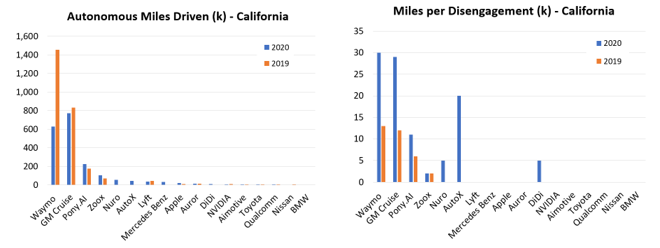
Source: California DMV Disengagement reports, 2019 and 2020
Building on this leading autonomy position, the Alphabet approach to transport and logistics is beginning to take commercial shape and spans four key elements. These are:
- Waymo Driver: represents the autonomous driving technology that is being sold to automakers. Volvo signed an agreement in Jun 2020 for Waymo to be the exclusive partner for their level 4 autonomous technology and Renault and Nissan have signed development agreement with Waymo in France and Japan.
- Waymo One: represents the autonomous ride hailing operation of Waymo. Waymo has partnered with a range of automakers to build a base of modified vehicles for the ride hailing service with key partners being Chrysler and Jaguar.
- Waymo Via: represents the logistics arm of Waymo where the autonomous technology is applied to trucking and last mile logistics. Waymo has signed a preferred partner agreement with Fiat Chrysler for the development of autonomous light vehicles and a non-exclusive agreement with Daimler to automate Class 8 trucks. Initial customer partners of Waymo Via include UPS and AutoNation.
- Wing: represents the Alphabet autonomous drone division focused on delivering small packages such as food, medicine and household items. Wing was the first firm to receive US Federal Aviation Administration approval and has been testing and building capabilities in niche locations such as Virginia, Helsinki and Canberra before a broader roll-out.
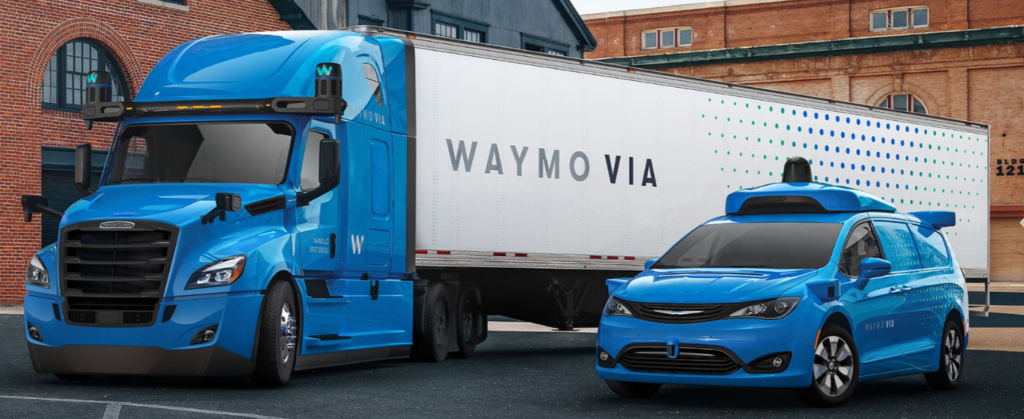
Source: Waymo
The opportunity across the transport and logistics markets is significant with Goldman Sachs estimating in a 2019 research report on global mobility that US$7tr of spending and US$700bn of profits are in line for disruption. The development of the Alphabet businesses leaves the company well placed to participate meaningfully as profits shift across the key transport segments of car ownership, mobility and logistics in the years to come.
Opportunity 2: Healthcare
Data and AI are colliding to create a range of opportunities in Healthcare, and again Alphabet is well placed to benefit from these emerging trends given their strength in these areas. The opportunity is significant with the US Healthcare Industry estimated to be a US$3tr opportunity on its own. There are three key legs to the Alphabet approach to Healthcare, with these being:
- Data generation: Through the use of wearables and partnerships with hospitals and research institutions, Alphabet is building a deep data source. Fitbit will feed into this data generation strategy.
- AI application: AI is being applied to the datasets to identify anomalies that may indicate a pre-condition or disease state requiring medical intervention.
- Heathcare tools: Tools are developed to assist in disease management or in the re-shaping of behavioural patterns to manage a perceived health risk.
Alphabet is exploring healthcare opportunities through two key subsidiaries – Verily and Calico – while also leveraging off their AI subsidiary DeepMind.
Calico
Calico is at the experimental end of Alphabet’s healthcare efforts with a focus on using technology to increase the understanding of biology that controls lifespan, then devising interventions that slow ageing and counteract age-related disease. The vehicle has raised $2.5bn through contributions from Alphabet and drug maker Abbvie, with Calico being responsible for early stage development and Abbvie to run late stage clinical development and commercialisation. In February 2021 Calico announced phase 1 studies in the areas of immune-oncology for cancer treatment and neurodegeneration with a focus on ALS, Parkinson’s disease and traumatic brain injury.
Verily
Verily’s focus is on using data to improve healthcare via analytical tools, research and interventions. The key focus areas to date have been diabetes, multiple sclerosis, Parkinson’s, and heart disease. In diabetes the Verily solution has spanned diagnostics and AI to determine patient condition and treatment options, an app to monitor glucose levels and provide nutritional guidance, through to a partnership with insurer Johan Hancock that will facilitate proactive and personalised diabetes support and management.

Source: Ondue which is a JV between Verily and Sanofi
Deep Mind
DeepMind is Alphabet’s AI subsidiary that was acquired in 2014. Among its work, it has run a number of health-based studies including AI driven diagnosis for eye disease where the DeepMind AI system could recommend patient referrals as accurately as world-leading doctors for over 50 sight-threatening eye diseases, and in breast cancer where in an independent study of six radiologists the AI system outperformed all of the human readers. An early stage cancer that was missed by all 6 radiologists but identified by the AI system is below:
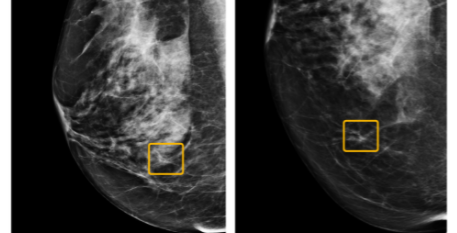
Source: Nature.com: International evaluation of an AI system for breast cancer screening
Alphabet is pulling together the elements to have a formidable position in health, with data generation, AI and technology creating a myriad of opportunities for Alphabet to explore in the coming years.
Additional opportunities
There is a broad range of additional industry positions that Alphabet is developing covering devices, travel, gaming, banking, and education to name just a few. Commercialisation of these efforts will only be bound by prioritisation of key initiatives and ensuring that Alphabet operates within the bounds of regulatory constraints.
Conclusion
The power of the core Google business with the potential to expand into tangential markets positions Alphabet well for the years ahead. In terms of the core advertising business, in our view underlying growth can continue in the 15-20% range in the coming years anchored by the dominant android mobile operating system (74% share globally and higher in developing markets), primacy in search, continued monetisation options through Youtube and Maps and an accelerating cloud computing position. On the tangential businesses, Alphabet is positioned to develop key businesses exposed to some of the most fundamental global disruptions, with transport and health key among them.
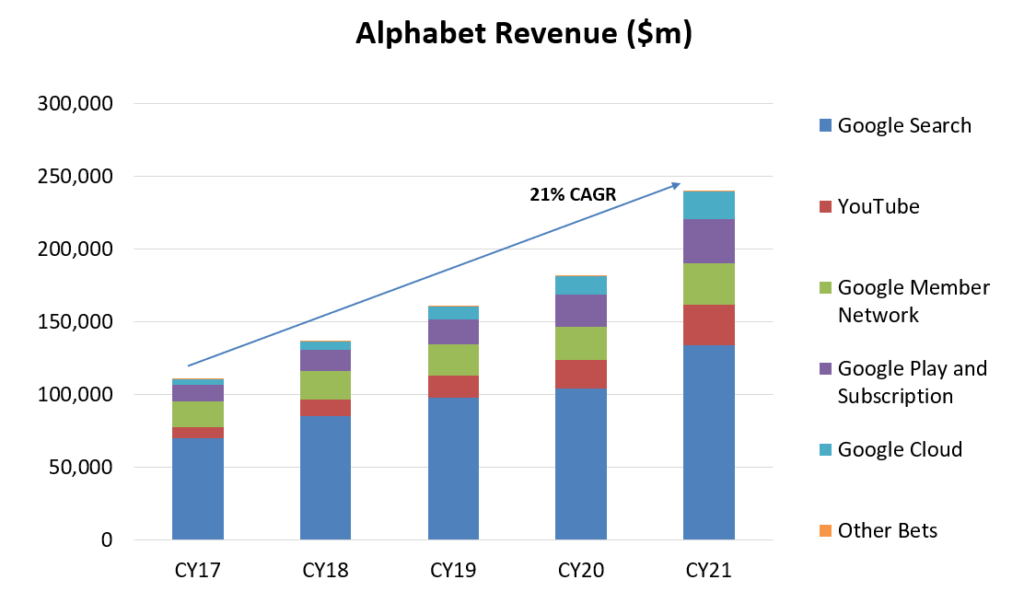
Source: Alphabet accounts, Alphinity analysis
Alphabet generates >25% operating margins, >20% ROE and ROIC, has more than $100bn of cash on the balance sheet and trades on 28x PE 1yr. The combination of business momentum, positioning, return outlook, positive earnings momentum and valuation makes Alphabet a compelling high conviction long term structural growth investment in both our Alphinity Global Equity Fund – Active ETF and Alphinity Global Sustainable Equity Fund – Active ETF.
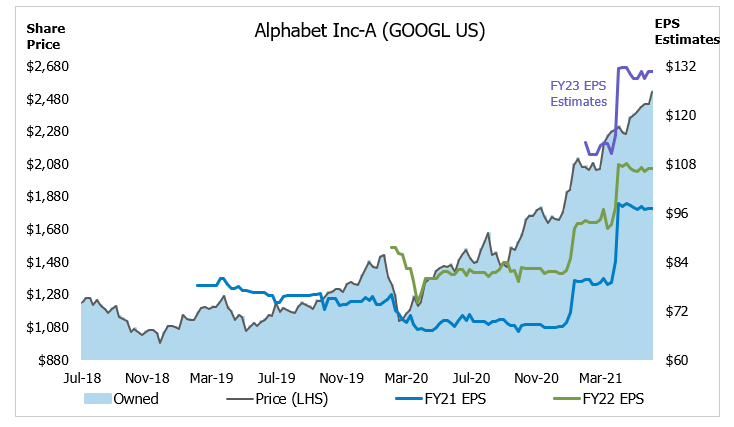
Source: Alphinity, Bloomberg, 11 July 2021
Alphabet: ESG and Sustainability Considerations
| Material ESG Factors | UN Sustainable Development Goals Alignment | |
| Privacy and Data | SDG 4 – Quality Education | |
| Share structure and ownership | SDG 9 – Infrastructure and Innovation | |
| Labour management and human capital development | SDG 11 – Sustainable Cities | |
| Responsible sourcing | ||
| Product safety | ||
| Indirect carbon | ||
| Corporate Governance | ||
| Climate change vulnerability |
With great power comes great responsibility: As a global leader in technology and AI, Alphabet is in a unique position to set the standard when it comes to using their market position for good in line with their Code of Conduct which states “do the right thing”. As an innovator that has made information so accessible, Alphabet has contributed substantially to the UN Sustainable Development Goals through activities that improve connectivity, education, equality, and social inclusion, especially in developing markets. But in the Information Age, the data that Alphabet captures also gives them immense influence over major markets and gives rise to privacy concerns. Technology developments have generally outpaced regulators who are just starting to catch up and in the wake of the EU commission review of tech giants’ management of harmful web content and anti-competitive practises, the opportunity for Alphabet lies in positioning themselves at the forefront of data governance and managing content with integrity.
In support of this objective, Alphinity voted for an independent director with human and/or civil rights expertise at the 2021 AGM.
One share, many votes: Alphabets multi-class share structure cements founder control over the business without majority ownership. While arguments exist that such structures are critical to underpin long-term corporate decision making in hard-to-innovate industries, given the stage of maturity a one share one vote structure appears more appropriate for Alphabet
In support of this objective, Alphinity voted for a proposal to revert to one-vote per share at the 2021 AGM
Opportunities in self-driving cars and advanced healthcare solutions propelled by AI: Entering these new fields will expose Alphabet to different product safety risks. Encouragingly, Alphabet have shown a cautious approach backed by extensive safety testing before exposing any customers to potential risks from these innovations. This has been demonstrated clearly in autonomy where Alphabet have validated product safety by driving >20m miles under test conditions before removing the safety driver from their Phoenix ride-hailing service, and the incremental expansion underpinned by extensive local safety testing to other markets.
Hidden emissions in the ~5.6 billion daily Google searches: Every click of a button comes with a small carbon cost. From the energy that runs devices and Wi-Fi, to the power consumed in semiconductor production, data centres and servers, global IT has a carbon footprint that is sometimes easy to overlook. Alphabet’s direct emissions have been completely offset since 2007 with a target to be carbon free by 2030. While their Scope 3 footprint totalled 12.5 million tCO2e in FY20, they are collaborating with suppliers to integrate battery-based systems and improve their energy efficiencies. Alphabet’s vision is for all suppliers to have access to clean, carbon-free energy in the future. Big players such as Alphabet play an important role in demonstrating climate leadership in the space.
Author: Trent Masters, Global Portfolio Manager




